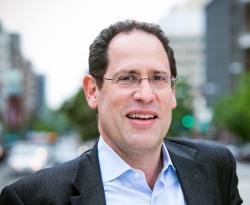United Kingdom Prime Minister Theresa May’s call for a snap general election on June 8 has threatened to overshadow another important vote that could reshape the landscape of urban leadership in England. On May 4, voters in six regions, including the large metros of Manchester and Liverpool, will head to the polls for the very first time to elect metro mayors (technically known as “combined authority mayors”). Collectively, these leaders will assume responsibility for almost 10 million people—nearly a fifth of England’s population—and economies worth £214 billion.
The importance of the new role goes beyond sheer scale and novelty and could have far-reaching impacts. Here are four reasons to pay close attention to this election and the urban governance transformation it could accelerate:
1. The six new metro mayors—and the combined authorities that they lead—will get new formal powers to plan, manage, develop, and govern their regions. Though the details of the devolution deals are specific to each region, this new group of mayors will all have responsibility for setting long-term economic development agendas and will have access to a 30-year investment fund that can be used to make grants for employment and development purposes. Most will gain control over at least some aspects of housing, transport, and skills; in Greater Manchester, where the combined authority has been in place since 2011, expanded powers include control over health care and social spending.
The powers of the mayors will be balanced (or diluted) by other actors and interests, and some critics have pointed out that the powers are still too limited to have far-reaching impact. Still, this is a significant increase in the power to plan and act decisively for the region as a whole. And this initial set of powers can be seen as a baseline for future negotiations—if successful, they could be expanded over time through secondary legislation in Parliament, as Manchester’s have been.
Source: Centre for Cities, www.centreforcities.org/publication/everything-need-know-metro-mayors/
2. The new mayors will have the potential to lead beyond the limits of their formal powers, setting a vision for the region and harnessing networks of public, private, and civic actors to deliver results. If the experience of London’s mayor is any indication, the new metro mayors are likely to be popular. This increased visibility and stature—combined with an explicit charge to act as a strong network leader to coordinate other actors in the region—could help them succeed in spite of the limited suite of formal tools and powers at their disposal.
As Bruce Katz and Louisville Mayor Greg Fischer have written, England’s metro mayors need only look across the Atlantic to find mayors exercising their role as networker-in-chief to set and deliver on ambitious and complex agendas. A report from the U.K.-based Institute for Public Policy Research lays out a number of recommendations for “enabling policies” that mayors can use to achieve a bigger bang for the bucks they do have: encouraging silo-busting, integrated planning, unlocking new finance mechanisms, and investing in opening and analyzing data for more effective government performance.
3. The new mayors could become a powerful voice—and target—to influence an urban agenda and address a growing democratic deficit. If they can align and organize, the new metro mayors have the potential to shape a metropolitan agenda for England and for the United Kingdom more broadly. Though they will likely come from different parties, these mayors will share common interests in transport networks, housing, and economic growth. If these pragmatic concerns can bridge partisan divides even to a degree, the metro mayors could become a powerful advocacy network for urban investments, working jointly to make the case that the success of the United Kingdom relies on the success of its cities.
They could also become an organizing target for advocates of inclusive growth, stronger transport, and more. While it is unlikely that the new mayors will play a formal role in Brexit negotiations and other matters of state, they could change the broader political context for these decisions. The Leave campaign gained traction in part as a backlash against centralized power in the United Kingdom and Europe. A group of directly elected, accountable mayors at the head of its largest metros could help the country address its democratic deficit and curb the regional disparities that lead to political shocks like Brexit.
4. This election expands on two big governance shifts—devolution of power to local government and consolidation of power in metropolitan regions—that have relevance for cities around the world. Greater Manchester’s regional governance experiment is now well established. (In many ways it is the blueprint for the devolution agenda that the U.K. government has been pushing in earnest since 2014.) The move toward metro mayors marks a significant expansion of both the devolution and consolidation trends and will prove a greater test of the models. Their success could be a force to accelerate the devolution wave, both to U.K. cities that do not currently have mayors and to regions that lack combined authorities.
Elsewhere in Europe, France and Italy have been on their own paths to streamline and consolidate local powers; in South America, Santiago was recently consolidated into a metropolitan government for the first time. In the United States, a contentious city/county consolidation proposal is playing out in Syracuse, New York, and the suburban annexation debate has been reignited by years of population loss in Chicago. All around the world, the boundaries of city governance are in flux. The way English metros embrace and adapt to their new leaders will have broader relevance for cities grappling with similar shifts.
The U.K. government has worked hard to raise awareness about the May 4 election and role of the new mayors. High voter turnout would undoubtedly provide a boost to the government’s broader devolution agenda and give the new mayors—even in the most hotly contested races like the West Midlands—the mandate to hit the ground running that their fledgling offices will be seeking.
Regardless of the outcome of these contests, the forces driving the devolution agenda from the top down and the ground up are very likely here to stay. Cities and metropolitan regions will continue to seek greater power and control over policies and development decisions that will shape their future. The central government has incentives—clearer in economic terms than political ones—to ensure that the cities powering the country are working. Whatever happens in England’s mayoral elections, its regional devolution experiment will have a lot to teach the world—if it will pay attention.
The Brookings Institution is committed to quality, independence, and impact.
We are supported by a diverse array of funders. In line with our values and policies, each Brookings publication represents the sole views of its author(s).






Commentary
Make way for mayors: Why the UK’s biggest power shift may not be the June 8 general election
May 1, 2017